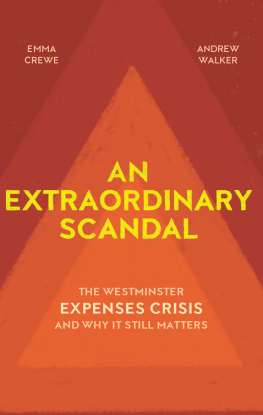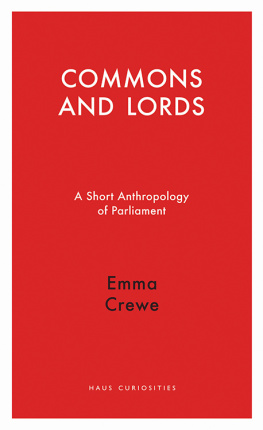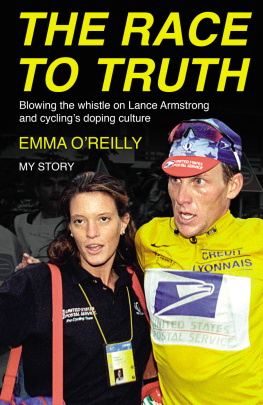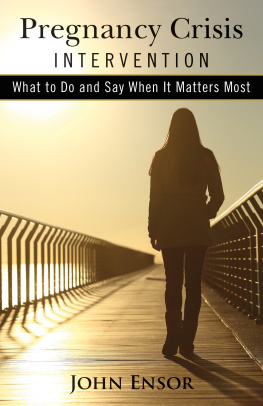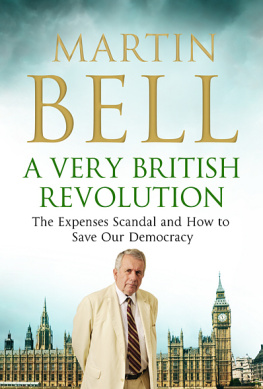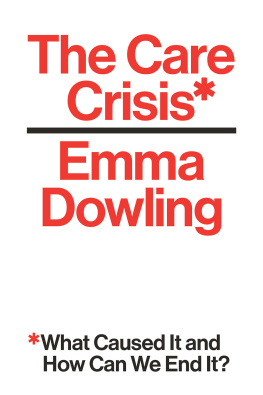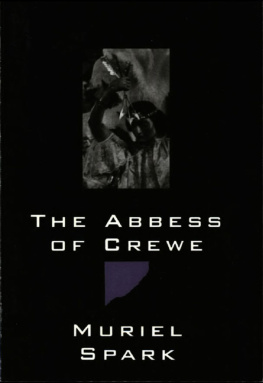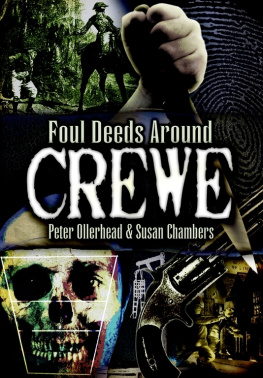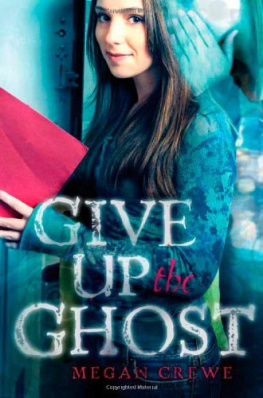First published in 2019 by
HAUS PUBLISHING LTD
4 Cinnamon Row
London SWII 3TW
www.hauspublishing.com
Copyright 2019 Emma Crewe and Andrew Walker
Emma Crewe and Andrew Walker have asserted their right under the Copyright,
Design and Patents Act 1988 to be identified as authors of this work
A CIP catalogue record for this book is available from the British Library
ISBN: 978-1-912208-75-3
eISBN: 978-1-912208-76-0
Typeset in Garamond by MacGuru Ltd
Printed in the UK by TJ International
All rights reserved.
Scripture quotations are taken from the Holy Bible, New International Version*, NIV*. Copyright 1973, 1978, 1984, 2011 by Biblica, Inc. Used by permission of Zondervan. All rights reserved worldwide. www.zondervan.com. The NIV and New International Version are trademarks registered in the United States Patent and Trademark Office by Biblica, Inc.
Preface and acknowledgements
W e met on the 750th anniversary of Simon De Montforts Parliament in 2015. Andrew, an official in the Commons, was thinking of writing an account of the expenses scandal of 2009 before memories were lost forever. Emma had just published a book about MPs at work in House of Commons during the 2010-2015 coalition. We talked about collaborating to inquire into a range of perspectives on the history of the expenses debacle.
We discovered that we share some perceptions about politicians and their world - a feeling that media attention on MPs and Parliament frequently emphasises extremes, and that the press often seem uninterested in the nature of their work and the complex and challenging working lives of MPs. Politicians perform an endless juggling act to govern, oppose or scrutinise; to pursue issues and campaigns in Westminster at the same time as providing a constantly developing advisory and support service for citizens in their constituencies; to integrate their work with family responsibilities, whether caring for elderly relatives or bringing up young children. We both sympathised with the human cost for MPs and their families that the scandal unleashed.
At the same time we each have our own specific moral sensibility towards money or, more specifically, expenses. Andrew used to work for the Inland Revenue and the Treasury, while Emma has worked for international charities combating poverty in Africa and Asia for years, finding herself annoyed when aid workers stayed in expensive hotels. We came to this research with the view that, collectively, MPs had failed to grasp and respond to public concerns but that this was not the whole story. Since Andrew had been Director General of Resources in the Commons administration at the time of the scandal, Emma did ask: Why will anyone believe our version if one of the authors was the official responsible for administering the system? He convinced her that his wish to honour all sides of the story would win out over a desire to paint himself as the blameless hero of the story.
So we decided to go ahead and embark on an inquiry into the crisis. Andrew had studied history and trained as an accountant; as it progressed our inquiry drew in part on his detective skills, trawling through newspapers, documents and memories of people inside and outside Parliament to reconstruct a persuasive version of the past. This was combined with Emmas anthropological practice as a researcher. Tim Ingold describes anthropology as philosophy with the people still in it: Anthropologists follow their noses, sniffing out promising sources and lines of inquiry. They are like hunters on the trail. To hunt, you have to dream the animal; get under its skin to perceive as it does; know it from the inside out.
Sometimes anthropology involves participant-observation, or thorough and long-term immersion into the lives of a group or organisation to find out about their world. Emma had already spent some years in each of the Houses of Parliament (Lords 1998-2001 and Commons 2011-13), and various smaller projects since then, but this time the task was historical. This book is a form of collaborative historical research, strongly influenced by our past experience - by Andrews 40 years of working in the public service and Emmas participant-observation research with politicians.
To make this inquiry possible, we spoke to MPs, former MPs, parliamentary officials and journalists. We listened to their versions of events, got them talking about what it was like, asked questions about the most puzzling aspects of the crisis and tested out theories. When we talk about the past, we all struggle to remember and to disentangle memory from wishful thinking - most often we want to believe we were better than we were. This was true not just of the people we spoke to but of Andrew himself. With a ferocious persistence, we challenged memories and accounts, discussing at length why someone said what they said, how plausible it was, how it sat alongside other statements or evidence.
As we wrote our account, a similar process ensued, requiring judgement in each specific example to make decisions about what was most plausible or unconvincing and how to deal with contradictions. This book has involved a process of compromise because we have sought to take account of views from many sides of the MPs expenses story. We have drawn on our own experience and past research, supplemented it with further research, and listened to these multiple perspectives. Since the versions of journalists, officials and MPs are irreconcilably divergent, and even we disagreed in our understanding at times along the way, how did we reach our own shared interpretation? The answer is that we formed a view based on the assumption that it is not about choosing between versions, but about using imagination to create an account that takes into consideration not only the views, but why they might be promoting that version, the context, what other sources indicate, and so on. It is with a sense of detached involvement in the material that an author (or in this case authors) can strive towards the most convincing theory and description of what happened. If you are too involved, you cant see the wood for the trees; if you are too detached, you lose a sense of proportion and fail to see there is a tiny fire burning in the middle of the wood.
Our account has not meant merging or agreeing with all views. Such a task would be impossible. It has meant exercising practical judgement, in the words of the philosopher John Dewey, taking into account generalised values in specific contexts within each decision (sometimes down to the choice of one word above another) in the quest to paint the most accurate moving picture in words that we can.
We are offering a complex answer to the question What happened in the expenses scandal? Of course, we may end up pleasing no one but we hope to give pause for thought, possibly even disrupting well-worn views on what politicians are like and how Parliament works. That task matters in an age where people claim we are post-truth. Working towards truthfulness is far from impossible - and it matters more than anything else - but it does require an extraordinary amount of effort. It is for the reader to judge whether this historical account takes us closer to such truthfulness. We hope it does.
Readers may notice that we have not adopted a monolithic approach to naming individuals. Instead, we have sought to adopt the parliamentary (and anthropological) convention of using the form the individual concerned prefers or is most popularly known by (thus we refer to Betty Boothroyd rather than Lady Boothroyd, or just Boothroyd).



